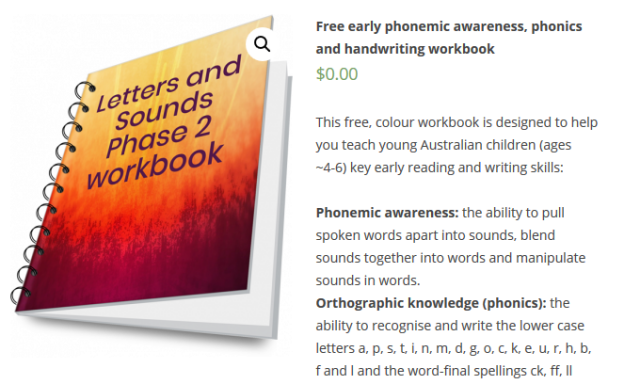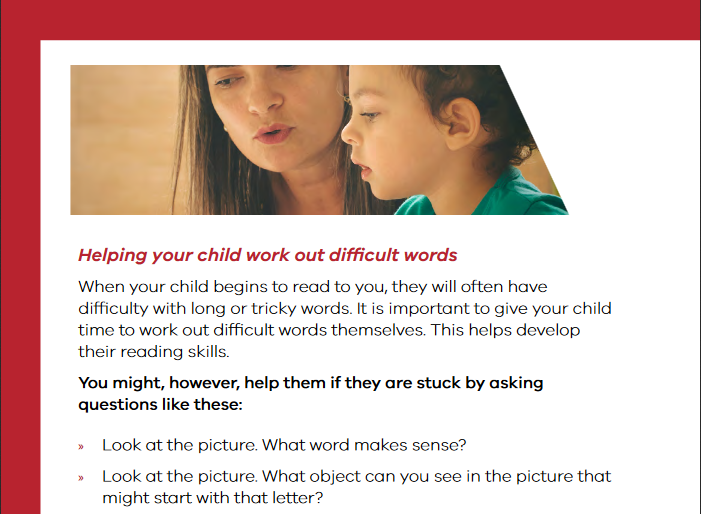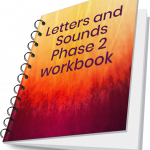Free early phonemic awareness, phonics and handwriting workbook
10 Replies
Last week, I read my state education department’s booklet advising parents on how to help children with literacy and numeracy. I understand it will be in the Prep bags given to all Victorian children starting school in 2019.
I was, frankly, appalled. The booklet mentions phonics only once, saying onscreen phonics games improve reading and “letter sound awareness”, whatever that is. It doesn’t mention phonemic awareness or handwriting at all.
A ton of scientific research has shown that phonemic awareness and phonics are key ingredients in getting literacy beginners off to a good start, along with work on vocabulary, comprehension and fluency, and that writing letters helps you remember them.
The Victorian Education Department’s top suggestion for parents when a child is stuck reading a word is to say: “Look at the picture. What word makes sense?” No, I’m not kidding. Here’s a screenshot from p14 of the booklet:

This advice flies right in the face of scientific evidence showing that context and syntax are not involved in skilled word-level reading. Unbelievable.
To stop myself from tearing my hair out or burning something down, I’ve made a free workbook to help people start teaching young Australian children (ages ~4-6):
- Phonemic awareness: the ability to pull spoken words apart into sounds, blend sounds together into words and manipulate sounds in words.
- Phonics: the ability to recognise and write the lower case letters a, p, s, t, i, n, m, d, g, o, c, k, e, u, r, h, b, f and l and the word-final spellings ck, ff, ll and ss, and link them to the relevant speech sounds.
- Handwriting: where to start each of these letters, how to form it correctly, and where to place it on the line.
It has a nice, fiery cover in my online shop. Just go through the checkout, it will skip over payment because it’s $0, and the site will tell you how to download it.

The workbook follows the UK Letters and Sounds Phase 2 teaching sequence, for which many teaching resources are readily available (just google “letters and sounds phonics phase 2”). Many of them free are or cheap, including this free book.
The last page of my workbook is a moveable alphabet containing just the letters/spellings taught in the workbook, for you to laminate, cut up, and use to build word sequences (e.g. make “pat”, change it into “sat”, change it into “sit”, change it into “it”). Suggested sequences are included, along with a couple of charts of upper and lower case letters.
While they’re using my workbook, children should be reading decodable books which follow the same teaching sequence, to practise what they’ve learnt. Suitable, affordable books include:
- The Pocket Rockets Phase 2, available in leaflet size (single pack or box of 10) or book size. I made a video of their author talking about them here, and me talking about them here (both made before the single pack and book size became available, and the apps died).
- The Junior Learning Phase 2 decodable readers, available in fiction and nonfiction.
The Ed Dept is correct that apps can help kids learn early literacy skills, but frankly, most apps are dross. Here are my app suggestions for helping young children learn phonemic awareness, phonics and letter formation using the iPad/iPhone (* = also available for Android):
Where free/cheap versions of these apps are available I’ve linked to them rather than the full version, so you can try before you buy.
For training on how to help a young child learn to read and write, try the free Udemy course “Help your child to read and write” from Sounds~Write.
I hope lots of little kids use my new workbook over our summer holidays, and that it provides the ounce of prevention many need to avoid a ton of cure. About one in five children find learning to read and spell words hard, so if 1000 kids use it well, it could make a difference to 200 of them, yay. I notice that 15 switched-on people have already downloaded it, on New Year’s Day, before I’ve even had a chance to publicise it. You lot are on fire.
I hope this workbook also helps reduce the parental heartache, confusion and expense associated with word-level reading failure, and steers parents of kids who were always going to struggle towards effective intervention, and away from snake oil.
In my experience, early years teachers are excellent people whose universities have often failed to equip them to teach phonemic awareness, phonics and handwriting really well. Teacher preparation courses often include very little about the reading science or how our writing system works.
Many teachers have few good phonics teaching materials, and not much money to buy them, but they want to teach in an explicit, systematic, evidence-based way. I hope this workbook helps them do that, and they go on to persuade their colleagues and organisations to use and promote systematic phonics (AEU, ALEA and PETAA members, please, get lobbying!). I hope teachers insist on giving parents good advice, and demand the same of education departments.
Finally (I wish I didn’t have to say this, I’m a speech pathologist, for crying out loud), phonemic awareness, phonics and handwriting are necessary but not sufficient for good early literacy-learning. Oral language is also vitally important. While young children are doing this workbook, they should also have lots of conversations and listen to lots of stories being read aloud. In fact I just had a lovely holiday at Uluru and brought back a pile of fabulous indigenous storybooks for my waiting room, for this very purpose.
Happy New Year, and enjoy the holidays, everyone!



You are so helpful. Your work reflects so much of the sincere passion you have within you to help children.
Thank You. You don’t know how much you are helping parents out there.
Thanks once again, Allison! You’re an amazing advocate for evidence-based reading instruction.
Thank you!!
I am already thinking of the kids I will have this year that will benefit from starting this first day back
Thank you for this!
Wow, this is an extraordinary gift, thank you so much! It is going to be invaluable.
[…] last blog post copped a little flak for its focus on the Victorian Education Department’s top two pieces of […]
This is fantastic. i am a worried grandmother too. Well done
Thanks, hope you’re not worried for long. Alison
[…] has a website and her books are available in larger size and parent packs. I’ve also made a free downloadable beginners’ workbook following the same teaching sequence as her books, which you can print and use with the first set […]
Thanks so much for this fantastic resource.